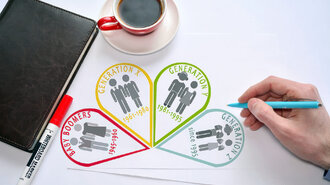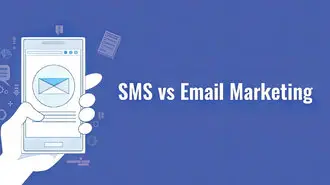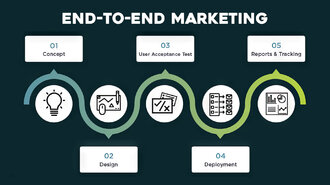Are you finding it hard to keep up with what your customers want and seeing profits slip?
While having a big business has advantages, maintaining strong customer relationships through upgrading advertising campaigns, sales strategies, customer policies, etc., to stay relevant.
But one of the toughest hurdles is getting everyone in the company on the same page, fostering teamwork across departments, and making the most of business data.
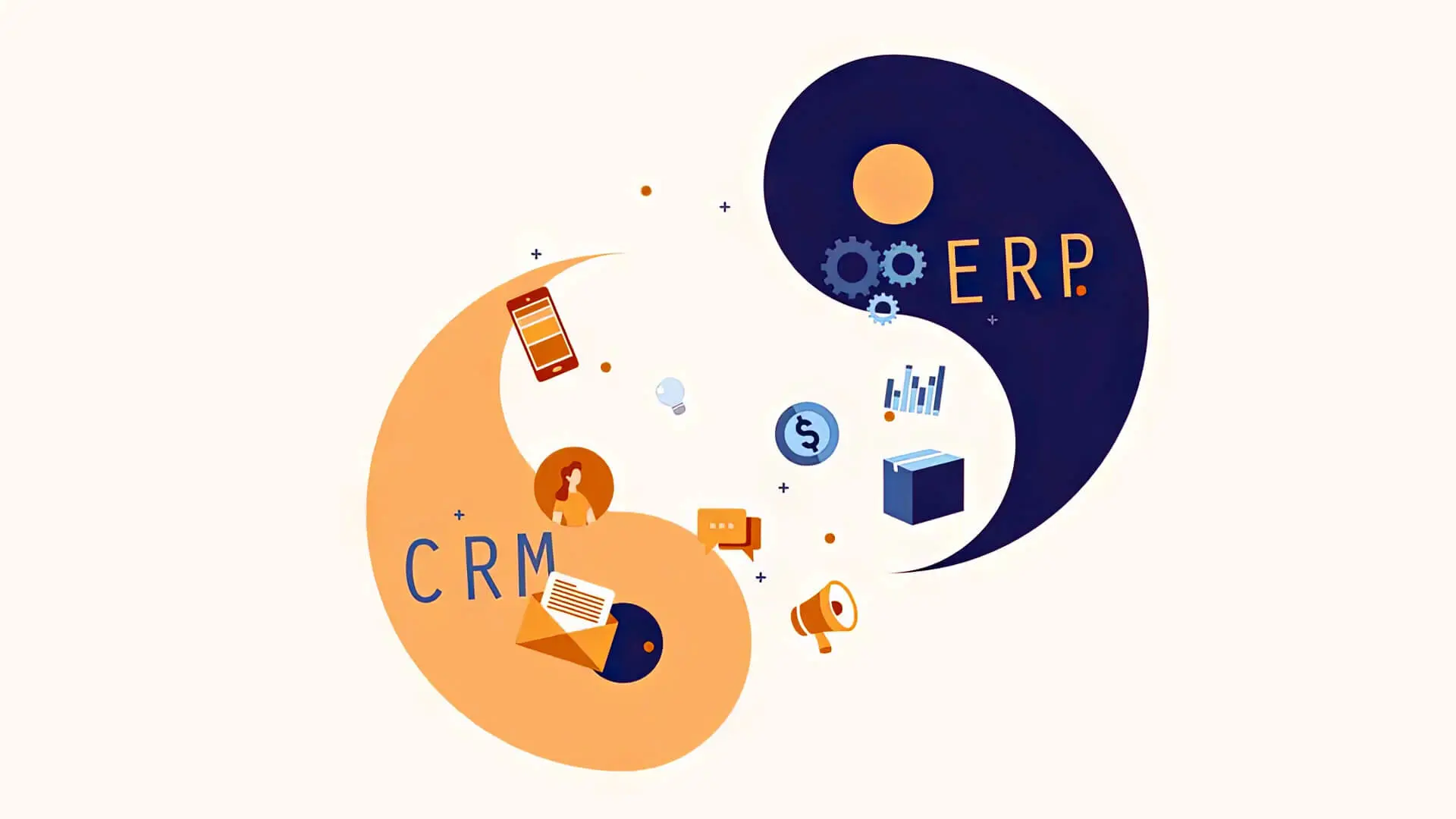
Many businesses opt for CRM or ERP systems to gain an edge, thanks to their integration of marketing tools and smooth order handling. But choosing the right software can be confusing, and that’s what this guide aims to clear up.
Suppose you are wondering about ERP vs.CRM. In that case, this article will highlight how ERP increases efficiency through data collaboration in relationship management CRM among departments, while CRM helps retain customers and convert prospective clients.
Want to receive updates? Sign up to our newsletter
Each time a new blog is posted, you’ll receive a notification, it’s really that simple.
What Is Sales Marketing Customer Service and ERP Software?
For comprehensive resource management and daily operations, organisations utilise software known as enterprise resource planning (ERP), covering aspects such as:
- Project management
- Supply chain operations
- Accounting
- Risk management and compliance
- Procurement
With an ERP system, businesses can streamline business operations in real time through social media, providing integrated tools for sales teams and marketing teams and know about enterprise performance management to predict, plan, budget, and report on the financial output, showcasing the numerous benefits of ERP systems.
Thanks to ERP systems, several business processes are bound together, and these systems provide a smooth data flow between them.
If you can access an organisation’s transaction history, you can use an ERP system to prevent data duplication. Hence, ERP systems and CRM systems enable businesses to remain competitive across multiple sizes, with ERP benefits being evident in these common factors:
- These systems help businesses as Real-time data enhances customer experiences and offers better insight into the sales and service aspects of the business through ERPs and CRMs
- Greater collaboration from users
- Low-cost financial and operational systems
- Lower risk
- Data-driven insights for higher efficiency
- enhanced customer support and reduced inventory management costs
- Consistency among various infrastructure
Since ERP systems use sales force automation to cut down on manual labour, saving time and cost, it gives employees more freedom to focus on other tasks.
Even in cases where ERP can’t automate tasks, the fact that it provides detailed information helps you make informed decisions at your fingertips. It ensures you can enhance decision-making and make an informed decision faster.
Once you’ve grasped the perks of CRM, let’s look at some ERP system applications:
- Inventory management
- Multiplier effect resulting from IT optimisation and automated reporting
- Sales and marketing customer engagement
- Purchasing
- Financial data management
- Manufacturing
- Works in tandem with CRM systems
- Human resources management
- Supply chain management
- Compliance monitoring
- Project management
- E-commerce
- Asset management
- Business intelligence
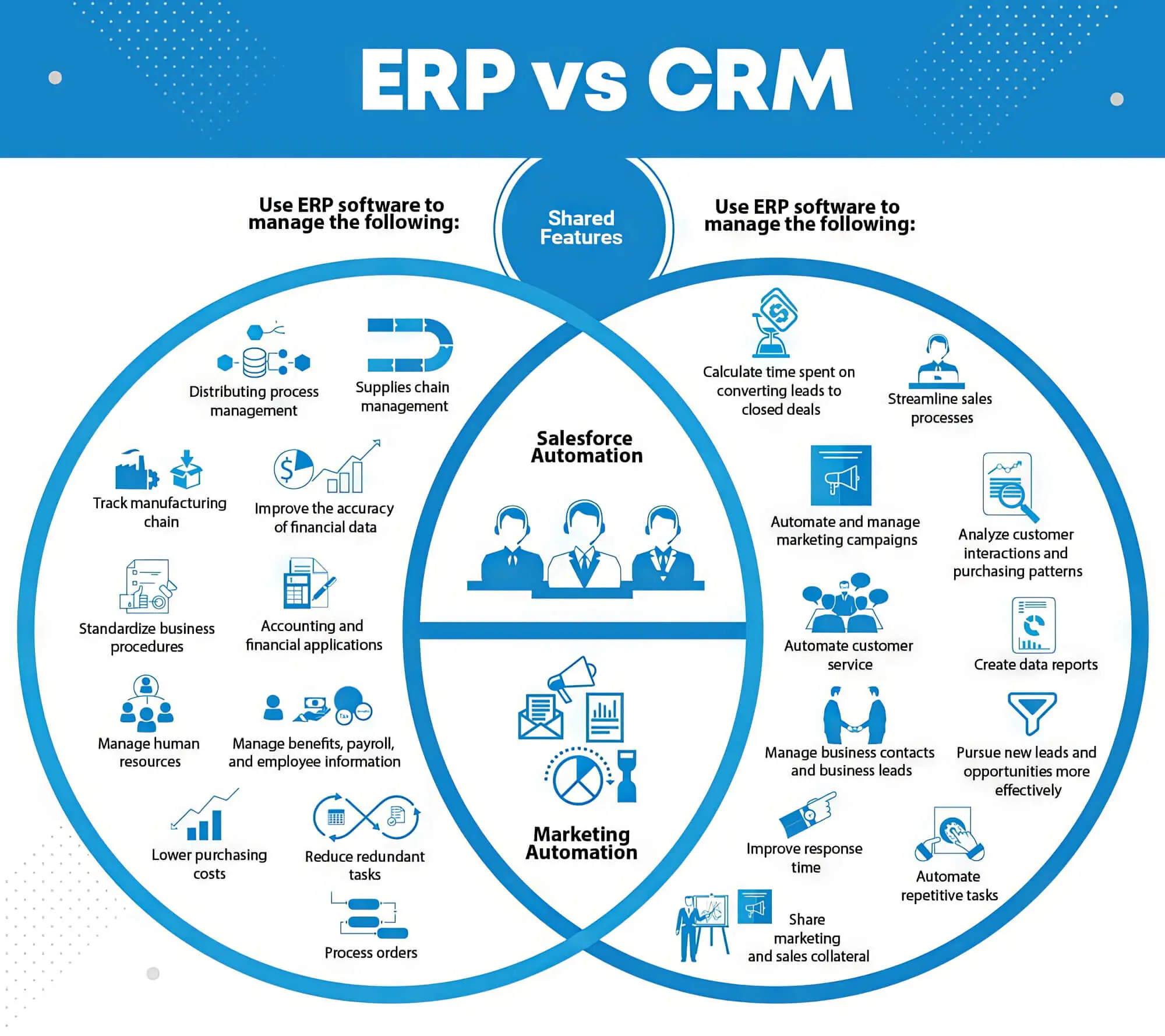
What Is CRM Software?
To nurture customer relationship management CRM and ensure their satisfaction, it’s essential to communicate effectively, a process facilitated by software called Customer Relationship Management (CRM).
With a CRM system, a business can better manage communications and exceptional customer service processes by maintaining accurate customer profiles to create long-lasting bonds with clients and leads.
CRM systems take the hassle out by reducing the need for several apps, spreadsheets, and databases. They help customer service teams centralise data and automate those repetitive chores.
This leads to increased efficiency in sales and marketing efforts among service teams and customer service representatives, organisational efficiency, improved time management, and positive feedback, leading to higher customer satisfaction for customer service departments.
Customer relationship management systems consolidate all data, including calls, texts, documents, emails, quotes, and purchases, thereby providing a comprehensive view of high value customers, enhancing sales, marketing, and improved customer service for a better overall experience to increase customer engagement.
Hence, multiple departments can access the necessary customer data at the right time through CRM systems integrating ERP through integrating CRM and ERP systems to deliver unmatched services or complete a sale.
The benefits of employing a CRM system for sales and customer service extend from managing outstanding customer service tickets to:
- Increased sales
- Effectively managing customer interactions
- higher customer retentions through advanced data analysis
- Greater efficiency and productivity
- Detailed analysis of core business processes
- Manage potential customers using marketing customer service strategies
- A central database of information
- Sales force automation
- Better customer segmentation
- Streamlining business processes
- Accurate sales projections
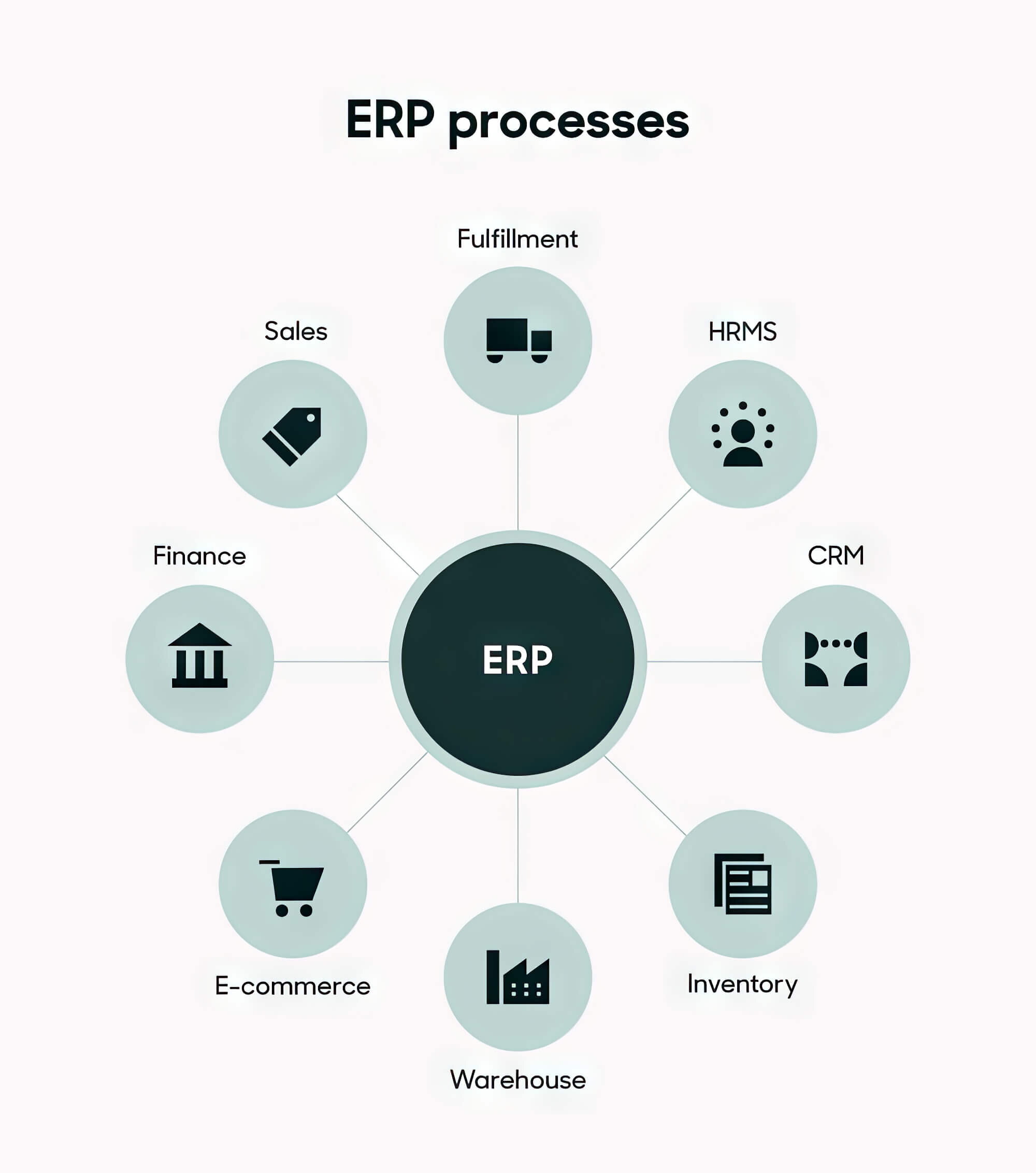
When executed correctly, CRM and customer service solutions improve customer satisfaction and ensure sustainable revenue growth, showcasing some of the significant CRM benefits.
Since various CRM tools can be integrated to track sales and analyse customer data, here are the most common uses for CRM systems.
- Omnichannel customer experience
- Automating mundane tasks
- Prioritising leads
- Personalising customer experience
- Sales outreach
- Creating sales prospects
- Sales performance management
- Converting leads
- Monitoring rival businesses
- Tracking churn rate
- Helping agents help customers
- Data security
Critical Differences Between ERP And CRM
While some businesses simultaneously use ERP and CRM solutions, it is crucial to understand the differences between CRM and ERP reporting and analytics in modern businesses.
A. ERP System
ERP systems offer solutions related to the entire organisation’s daily functioning, be it business management or logistical analysis.
The objective is to ensure a business’s smooth functioning and operational efficiency through ERP integration. This enables business leaders to maintain a steady data flow among various departments, such as accounting, order management, and human resources.
Businesses utilise ERP systems to streamline operations and facilitate efficient information flow.
Exploring the features of ERP, some key components include:
- Integrating essential services to run the company
- Web-based applications for easy access through various interfaces
- Helps monitor the growth of the organisation
- Allows businesses to manage their resources
When To Use An ERP System?
Check out the following points to better understand when you should use ERP systems rather than a CRM solution for better back-office management.
1. Finance Department Management
ERP software solutions often focus on core processes like accounting and financial management tools to provide a single source of truth. With financial tools, you can stick to the predetermined business budget, forecast future finances, and calculate taxes.
2. Customer Relationship Management
CRM and ERP software are sometimes used together but are less effective than standalone CRM systems. However, combining the two is ideal for businesses with basic CRM needs while focusing on other parts of the sales process.
3. Human Capital Management
ERP software also helps you manage people, thanks to HCM tools that schedule work hours, approve sick leave requests, handle PTO, or distribute wages. You can also use HCM tools for project management and check projects staff members are currently handling.
4. Supply Chain Management
As part of an ERP solution, management supply tools will support business growth by managing front-office tasks efficiently and help you with the following:
- Product Distribution
- Managing purchase orders
- Regulatory compliance
- Quality monitoring
- Manufacturing
5. Inventory Management
You can create automated ordering points and notifications through IM when stock levels are running low. Moreover, it’s possible to create comprehensive solutions by combining IM with warehouse, distribution, and manufacturing.
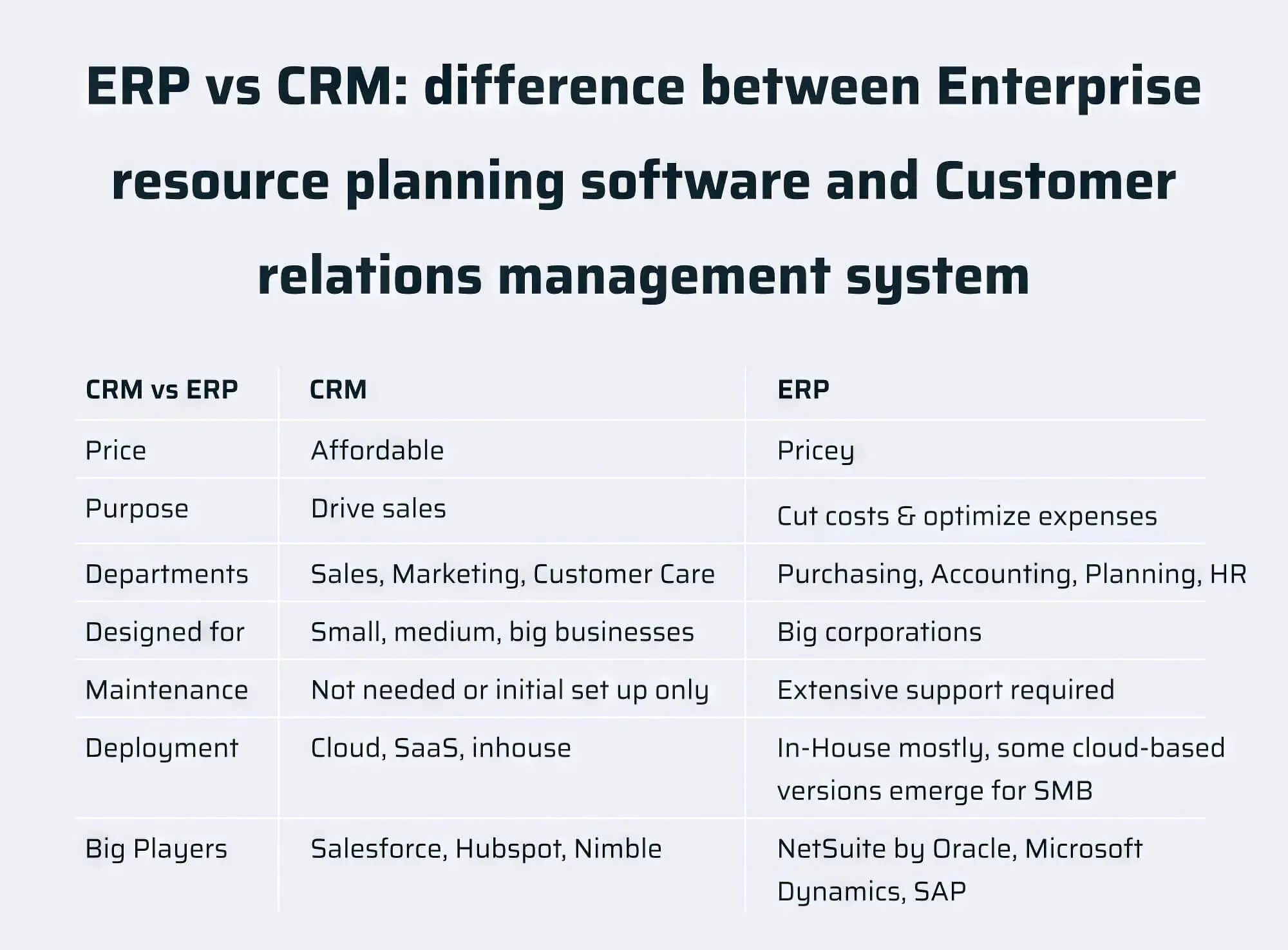
B. CRM Software Systems
Compared to ERP systems, CRM, also known as customer relationship management, offers a broader range of features to manage customer service interactions effectively. The scope of CRM integration has more to do with customers by getting in touch with prospective clients.
This software automates customer service to boost user experience and seamlessly syncs sales with third-party tools. A CRM system’s goal is to nurture leads, enhancing overall performance, particularly in sales, while delivering top-notch customer service.
Key features of a CRM system include:
- CRM tracks and manages an organisation’s functions
- The main focus is on prospects and customers-facing activities that generate leads
- Integrates customer services in one place
- Increases sales
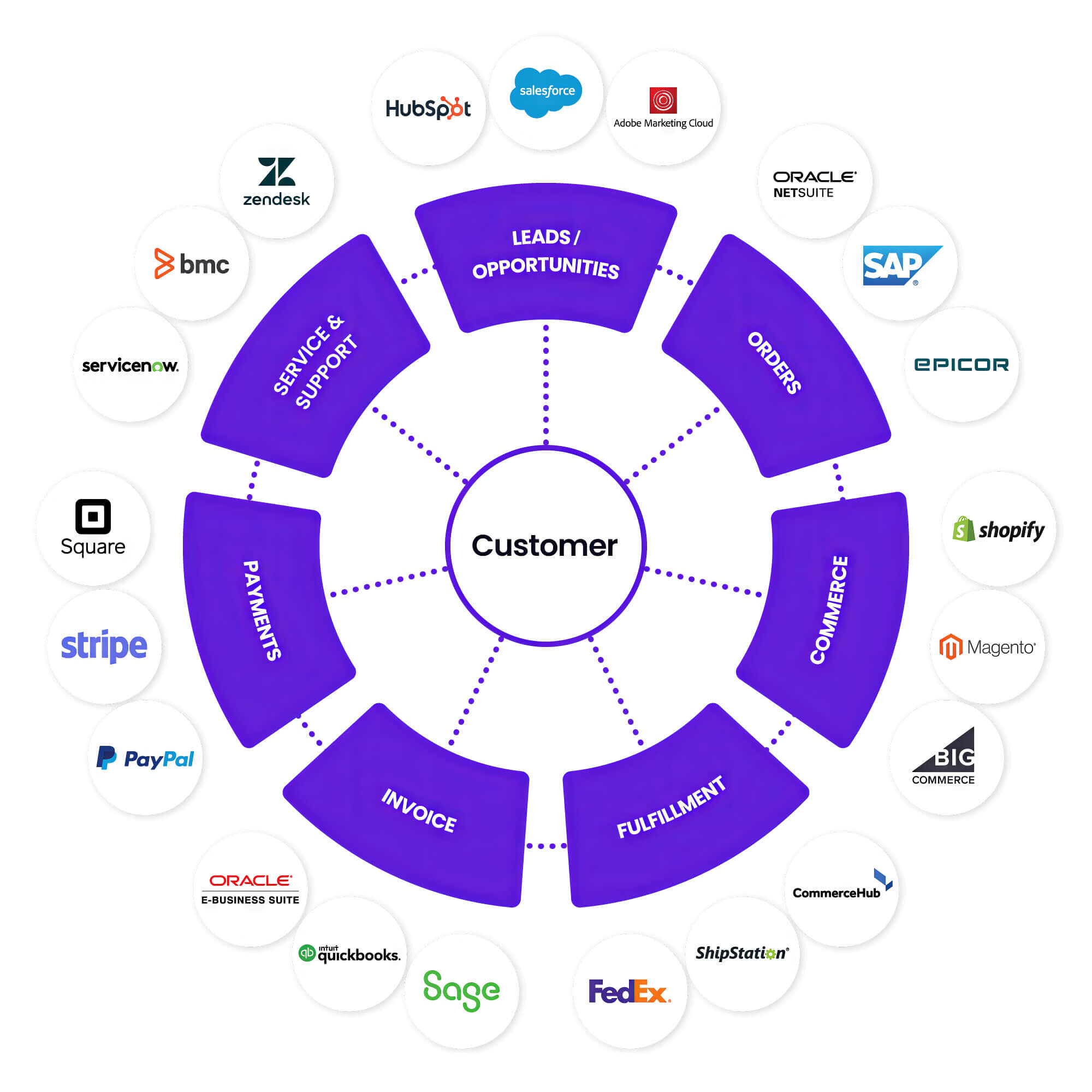
When To Use CRM Systems
With enhanced CRM functionality, effective customer service management can be achieved, leading to the conversion of customers into recurring clients. Here are some ways you can do so:
1. Managing Customer Service Interactions
You can track clients based on their purchase history, improving customer satisfaction, buying behaviour and interests. This also allows the sales team to segregate customers into different groups.
2. Contact Management Systems
With contact management systems, sales marketing customer users can handle customer communications, data entry, editing, and tracking of customer information. Collecting invoices, contracts, and documents and assigning specific contacts to sales representatives becomes easier.
3. Marketing Campaigns
For your marketing campaigns to be successful, you must target the correct audience through advertising. You can use a CRM system to shortlist prospective campaign targets and determine their effectiveness.
4. Database Management
Through database management tools, individuals across the organisation can easily access the required information about critical business procedures from the exact location. You can even clear irrelevant or dirty data for proper analysis to reduce duplicity.
5. Lead Management
Be it from email marketing, referrals or landing pages, CRM features lead generation from several sources. You can enhance customer service by developing lead routing throughout the customer journey and tracking how clients progress through the sales pipeline with territory management and hierarchy relationship tools.
How To Choose Between ERP And CRM Software?
To choose the right business software for enhancing your company’s internal operations between ERP and CRM systems, it’s important to consider the requirements of the business. The main difference between the two is the data used to generate business insights.
While ERP uses internal data to streamline business functions and the flow of information between various departments, CRM requires external input from prospective clients. Some signs you may need a CRM system include the following:
- Unable to retain customers
- High customer acquisition costs
- Disorganised sales process
- Departments must be updated with info on goods and services
- Low sales baseline
- No effective strategy regarding promising accounts or regions
- Want to enter a period of growth
- Looking to hypercharge your revenue
However, if these issues are not your concern, you might need an ERP system. So, here are some signs of when to use ERP systems:
- Higher expenditure on business operations
- The organisation is struggling to adhere to industry-specific regulations
- Want to grow your business in new regions and industries
- Fail to react quickly
- Lack of accuracy about customer demands and market trends
- Looking to reduce costs and save time
- Want to create efficient workflows
Understanding the benefits of ERP will clarify the choice between a CRM or ERP system.
Integration Of ERP And CRM Software
Businesses can select CRM and ERP integration, merging ERP and CRM systems into one powerful tool. That said, even though ERP and CRM systems have several benefits, don’t expect them to solve all business issues.
For instance, you can customise ERP implementations to optimise resource allocation and integrate different departments and their varied roles into one functional body. This will provide more clarity in terms of actionable items.
Moreover, cloud-based solutions, remote software deployment, and cloud computing facilitate the integration of ERP and CRM systems. But before you use both platforms, answer the following questions.
- Does the creation of products and services depend on responding to sales forecasting?
- Is the organisation big enough for integration, which is primarily used, between accounting and sales?
- Are you currently using multiple systems for business management?
- Is your tech stack bloating?
Some of the benefits sales reps and other employees will enjoy after integrating CRM and ERP include the following:
- Greater collaboration among employees
- Insight into customer views
- Faster sales approvals
- Preventing data duplication
- Better handling of financial and operational data
- Service customers efficiently
Streamlining Your Business: Unravelling the Difference Between ERP and CRM
As the debate between ERP vs CRM rages and businesses are left scratching their heads about which software to use, hopefully, this guide has offered some clarity.
The basic difference between the two lies in how they use the information available to improve business processes. These systems also help businesses share data efficiently.
While ERP and CRM help businesses improve efficiency by focusing on the smooth passage of information among various departments, CRM concentrates on customer data and converting prospective clients, highlighting the difference between CRM and ERP.
You can even use both software to increase sales and track how people respond to marketing campaigns. To stay relevant in the market, keep updating your preferred system every 3-5 years.
FAQs
1. How can an ERP system fail?
An ERP system can fail due to a number of reasons, such as challenges with customer management, as well as:
- Inaccurate expectations
- Internal dissent
- Not enough supporting tools
- Stakeholders not showing enough trust
- Digital adoption initiatives
- Hazily-worded training
2. How frequently should you update ERP?
There is no standard time frame for updating ERP, but such systems usually last from 5 to 10 years. However, feel free to upgrade the system if you think your business needs to catch up and certain things can be improved.
3. How will you know if an ERP is successful?
There are three simple ways to determine whether an ERP is successful:
- Significant increase in productivity
- Positive return-on-investment
- Client satisfaction
4. What are the essential components of a CRM system?
The essential components of CRM systems include:
- Loyalty
- Satisfaction
- Customer retention
- Profit making
5. What are the three main types of CRM?
The three main types of CRM include:
- Analytical CRM
- Collaborative CRM
- Operational CRM
If your business comprises several departments that find it challenging to work together, you can use collaborative CRMs, while operational CRMs make the most of customer information. On the other hand, when a company has a lot of customer data but needs to learn how to use it, analytical CRMs will prove ideal.

